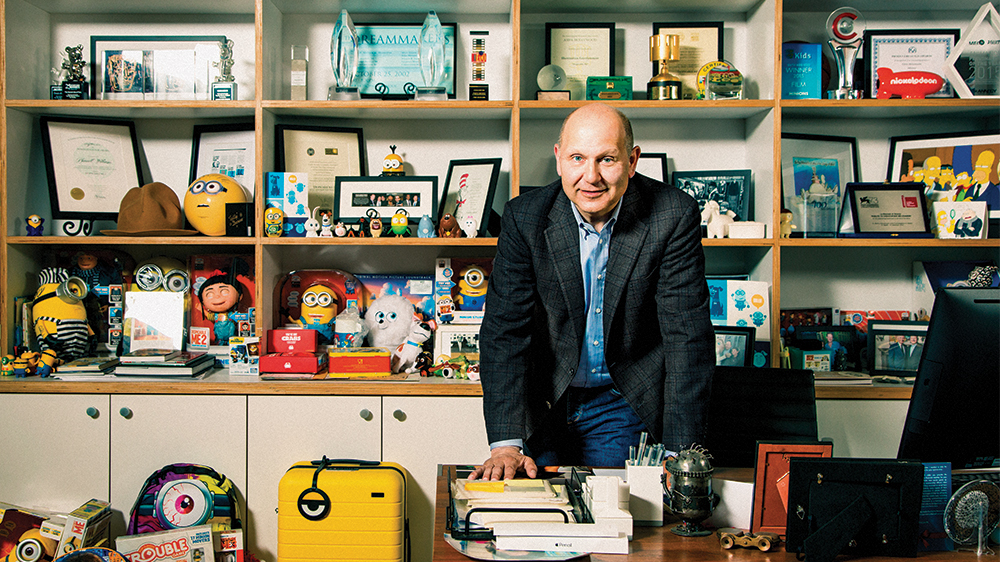How Chris Meledandri Became the Most Powerful Man in Animation
By Brent Lang
LOS ANGELES (Variety.com) – Chris Meledandri is Hollywood’s most reluctant mogul.
With Jeffrey Katzenberg selling DreamWorks and John Lasseter forced out at Disney over harassment allegations, the founder of Illumination Entertainment is the last person standing among the trio of industry animation titans.
Whereas Lasseter for decades cut a larger-than-life figure at Pixar’s sprawling campus in Emeryville, Calif., dominating rooms with his Hawaiian-shirted ebullience, and Katzenberg’s oracular intensity oozed out of every square inch of DreamWorks’ former 15-acre Glendale headquarters, the shy and deeply intellectual Meledandri prefers to retreat behind his work at a rather modest Santa Monica office building with minimal signage. He lets the films speak for themselves.
“He’s a little bit of an enigma,” says Chris Renaud, the director of “The Secret Life of Pets” and “Despicable Me.” “He’s a creative guy, but he looks like an executive type. He’s always wearing a jacket.”
When “The Grinch” hits theaters on Nov. 9, it will likely extend a run of box office hits that hasn’t been seen since Pixar’s glory days. The animated adaptation of Dr. Seuss’ classic holiday tale is the latest offering from Illumination, a company that has established itself as one of the preeminent brands in family entertainment thanks to the “” franchise as well as “Sing” and “The Secret Life of Pets.”
These films differentiated themselves from wave upon wave of Disney imitators because, in the words of Meledandri, they “have a little bite to them.” Illumination movies — which are produced for less than half of what a typical Pixar film costs (“Grinch” had a $75 million budget) — appeal to older viewers, not just kids, in part because they carry PG ratings, boast popular music from the likes of Pharrell Williams and Tyler the Creator and are as interested in scoring big laughs as they are in tugging heartstrings.
“We embrace the subversive,” Meledandri says during a two-hour interview with Variety in October. “But the real sweet spot is when we find something that is not only subversive but also has some real emotion to it.”
That kind of alchemy has reaped dividends. Since launching 11 years ago, Illumination’s movies have grossed more than $5.8 billion globally, and the company has fielded three of the top eight highest-grossing animated films ever released. Its “Despicable Me” series is the most successful animated franchise in history.
Donna Langley, chairman of Universal Pictures, Illumination’s co-owner and distributor, likes to tease Meledandri by calling him Eeyore, after the famously pessimistic Winnie the Pooh pal. “He worries more than anyone else,” says Langley. “He stays up later thinking about an issue than anyone else. The process can be fairly anxiety-provoking for him. But at the same time he wants to spread joy with his movies, and nothing pleases him more than when he hears about a child or teenager with a special connection to one of his films.”
Meledandri’s movies have their sophomoric side. Spit takes and fart jokes abound. Yet there’s a thematic tissue that binds these films together: an emphasis on the creation of unlikely families and an allegiance with society’s underdogs. In “Despicable Me,” Gru, a self-described super-villain, finds his moral compass after taking in a trio of orphan girls. “Sing” centers on a group of unlikely talent-show contestants, ranging from a bored housewife to a bank robber, who discover their purpose onstage. And “” revolves around an ogre-like outcast who ends up rediscovering a sense of community while trying to ruin Christmas.
“It’s about hope versus hopelessness,” suggests Meledandri. “The underlying story of ‘The Grinch’ is about how the innocence of one child is able to crack this character’s facade and to get him to see the world from a different perspective. It’s a story that has a lot of relevance today.”
“The Grinch” is Meledandri’s third Seuss adaptation. He previously made films of the author’s “Horton Hears a Who” and “The Lorax,” a process that gave him close ties to the estate of Theodor Geisel (the man behind the Seuss pen name) and his widow Audrey. It’s the moral message at the heart of Seuss’ work that has kept Meledandri coming back for more. In a 2015 speech at the Annecy Film Festival, Meledandri spoke movingly about the power of stories to inspire empathy, saying that was the only way to “undo the extreme divisiveness that plagues us.” That belief has only intensified, he says. Most moviegoers will look at “The Grinch” as a charming holiday bauble, but Meledandri sees the story as an antidote to Trump-era polarization.
“Stories allow us to relate to characters who are living lives that are dramatically different from our own,” says Meledandri. “We can stand in their shoes. Fear what they fear. Dream what they dream. As global challenges become more intense the tendency is to, like the Grinch, close in on ourselves and become more tribal.”
Of course, “The Grinch,” being an Illumination movie, offers plenty of pratfalls between the life lessons.
Meledandri didn’t grow up obsessed with animation. The son of Roland Meledandri, a noted men’s clothing designer, and Risha Meledandri, an activist, gallerist and poet, he was raised on New York City’s Upper East Side. His was a moviegoing household, one whose preferences veered toward Scorsese, Fellini and Kubrick,
without any Disney detours.
“New York parenting of that era was not about indulging what your kid wants to do; it was more about serving your own tastes,” he says.
Consequently, it was only through his children that Meledandri was exposed to animation, watching along with them as they saw “The Lion King” and “Shrek,” and eventually more experimental works, such as Hayao Miyazaki’s “Spirited Away.” By that point, Meledandri had established himself in the movie business, producing films such as the Olympic bobsledding comedy “Cool Runnings” and the Dana Carvey vehicle “Opportunity Knocks.”
| Works by Dr. Seuss — including Illumination’s “The Lorax” (2012) and upcoming “The Grinch” — have been a frequent source for Meledandri. Courtesy of |
While Meledandri might have been a late convert to the genre, his big break came in 1994, when he was tapped to head Fox’s family division, overseeing hits such as “Anastasia” and “Ever After.” Four years later he was asked to found Fox’s first animation-only unit, a major promotion that seemed to portend great things. Instead, a career that had been on a meteoric rise was nearly derailed. “Titan A.E.,” an ambitious and costly futuristic animated story about a group of humans traveling through space after Earth is destroyed, was a massive failure. Released in 2000, the film lost $100 million and almost cost Meledandri his job.
“It was one of the hardest periods of my adult life,” he remembers. However, the film’s collapse taught him a valuable lesson.
“Prior to ‘Titan,’ I went through life believing that a major professional failure would destroy me,” he says. “I learned on ‘Titan’ that while it came close to destroying me, I survived it and I no longer had that conviction that failure would slay me.”
Meledandri recalls he was persona non grata on the Fox lot in the immediate aftermath of the failure of “Titan A.E.” But one person who stuck with him was Peter Chernin, the head of Fox’s entertainment division at the time, who opted to give the executive a second chance.
“Failures can be unbelievably valuable opportunities, with the proviso that the person has to be introspective and thoughtful enough to learn from them,” says Chernin.
The executive’s faith in Meledandri turned out to be justified. His next film, “Ice Age,” a comic story of a group of Paleolithic creatures who band together to survive the big freeze, became one of the biggest hits in the studio’s history, launching a venerable franchise. It made Meledandri one of Fox’s most valuable creative execs, but after a few years, he began feeling the entrepreneurial tug. When Meledandri’s deal came up for renewal, Fox was desperate to sign him, but he turned down the studio’s overtures to start his own animation venture, Illumination, with Universal’s financial backing. The partners forged a deal that gave Meledandri co-ownership and a percentage of the profits.
“He was running a division at Fox, but he knew it would always be Fox’s division, and he would just be a hired executive,” Chernin tells Variety. “He wanted to make something that was wholly his own. He was at a stage in his life where he didn’t want to be an employee anymore.”
Janet Healy, the producer of “Shark Tale,” was one of Meledandri’s first hires. Together the pair began looking at the family entertainment landscape to try to figure out where there was a void.
“We kept redefining our mission and narrowing down what the goals were,” says Healy. “Ultimately, we hit upon the idea of making humor-based comedic films that could appeal to all ages and on a global basis.”
Meledandri’s time in the wilderness after “Titan A.E.” helped him as he readied himself for the challenge of launching Illumination. He came away from the experience believing that the film had failed in part because he didn’t trust his own instincts. For his first project, he wanted to find the type of script that would have scared off other animators. In “Despicable Me,” a children’s film about an antihero, he hit paydirt. But it took some convincing to get others on board.
“We had the inevitable, somewhat lazy concerns,” admits Langley. “We thought kids wouldn’t understand the word ‘despicable,’ and parents wouldn’t want to send kids to a movie described as despicable.”
There was also a great deal of trial and error. Namely, the original designs for Gru, the criminal mastermind at the heart of “Despicable Me,” didn’t capture the spirit of the character. He was tall, dark and gaunt, but Meledandri and the animators ended up realizing that another character, an Uncle Fester doppelgänger that was supposed to be Gru’s sidekick, worked better as the central figure.
“It was the right combination of tall and villainous, but with some vulnerability,” says Renaud. “That’s what Chris does. He lets you bounce ideas back and forth, and then he takes those ideas and refines them.”
Meledandri may be riding high, with “The Grinch” poised to strike it rich at the box office and sequels to “The Secret Life of Pets” and “Sing” on tap. However, he recently turned down a chance to expand his empire. When Universal bought DreamWorks Entertainment in 2017, there was speculation that he would lead both operations. Though tempted, Meledandri passed on the job. At Illumination, he starts many of his days huddled with his team around an Avid, going over the latest work from his animators. He’s intimately involved in everything from the editing of his movies to their marketing and distribution. Balancing that kind of attention to detail with the demands of running two companies seemed overwhelming.
“The way in which I work with my team to make movies is very intensive and hands-on, and it really doesn’t allow me the opportunity to think about running a second operation,” says Meledandri. “I love the process of making films and working with artists. I don’t think I’m particularly great at managing companies.”
Instead, Meledandri has taken on the task of reviving “Puss ’n’ Boots” and “Shrek,” two of DreamWorks’ best-loved properties. Even though he wants to find a fresh way to revisit these stories, Meledandri isn’t interested in a total revamp. Part of the popularity of “Shrek” is attributable to a voice cast that included Mike Myers, Eddie Murphy and Antonio Banderas, and Meledandri would like to get the band back together.
“When you look back on those vocal performances they’re awesome, and while you certainly could make a case for a complete reinvention, I find myself responding to my own nostalgic feelings of wanting to go back to those characterizations,” explains Meledandri. “The challenge for us has been to find something that really does feel like it’s not simply yet another film in a series of sequels.”
“Shrek” isn’t the only well-known property getting the Illumination treatment. Meledandri is working on an animated version of the Nintendo game “Super Mario Bros.” that will be in theaters by 2022. There’s reason to be cautious. “Super Mario Bros.” already inspired a famously terrible 1993 movie — a film so bad that star Bob Hoskins dismissed it as “the worst thing I ever did.” Meledandri thinks he knows what went wrong in that instance: The filmmakers didn’t work with the game’s creators. He’s rectifying that this time by working hand in hand with Shigeru Miyamoto, the designer and producer responsible for creating the Mushroom Kingdom.
“It’s an ambitious task,” notes Meledandri. “The challenge is taking things that are so thin in their original form and finding depth that doesn’t compromise what generations of fans love about Mario, but also feels organic to the iconography and can support a three-act structure.”
As Illumination enters its second decade, Meledandri seems interested in fostering an almost repertory-like environment. He works repeatedly with filmmakers such as Renaud and Pierre Coffin, and has employed Pharrell Williams’ talents in a number of capacities, asking him to write songs and scores — and in the case of “The Grinch,” tapping him to be the film’s narrator. That collaboration between the animator and the pop star stands to grow even deeper. Meledandri and Williams are working to develop an original family film.
“It’s a meeting of the minds, with everyone able to bring their own skill set,” says Williams. “What I love about Chris is he doesn’t make you feel like you’re just being hired to do something. He gives you a seat at the table.”
“Stories allow us to relate to characters who are living lives that are different from our own. We can stand in their shoes. Fear what they Fear. Dream what they dream.”
Meledandri acknowledges that it can be difficult to balance the need to keep churning out sequels to his hits with the importance of developing future franchises by backing original material. But he does have more leeway than most in the industry. The success of “Despicable Me” and “Minions” has left him playing with the bank’s money, so to speak. The studio has released eight films in total, and every one of them has been profitable. That’s remarkable considering the uneven track record that others have suffered when they’ve tried to get into the animation space. Warner Bros. has made animated movies in fits and starts, for instance, and Sony and Paramount have had mixed success with their family fare. Pixar and Disney have inspired many competitors but few real challengers.
Universal thinks that Meledandri has managed to do something else in the movie business that few have done: create a brand that’s recognizable to consumers. To drill the point home, the studio features an opening title card in its movies that includes the “” characters pulling pranks on each other.
“There’s no question Illumination is a brand that resonates, and that’s a difficult thing to do in the movie business,” says Jeff Shell, chairman of Universal Filmed Entertainment Group. “You hear the word ‘Universal,’ and that’s not really a brand that means anything to people. But Illumination has become something people recognize and know what kind of product they’re getting.”
It has also required Meledandri to be the somewhat reluctant public face of the company. He makes a point of stressing the important role that Healy and others play in keeping things running, and emphasizes that animation is one of the most collaborative of art forms. Even his headquarters, several freeways removed from the heart of Hollywood, have a humble quality about them. There are “Minions” lunch boxes, colorful fake trees left over from the “Lorax” promotional campaign and movie posters (including one for “Titan A.E.”), but the space is largely devoid of photos of Meledandri doing grip-and-grins with celebrities, for instance.
Friends and colleagues say the work is everything to Meledandri. They’re hard-pressed to list any of his hobbies beyond moviemaking, and they marvel at the drive that keeps him answering emails at all hours. This summer, however, the executive tried to unplug. He went by himself on a retreat to Rancho La Puerto in Tecate, Mexico, where he hiked, meditated and made a point of not checking his phone. The experience revived him.
“It was like going into the cafeteria on the first day of college,” Meledandri says. “Nobody knew who you were or knew your name.”
You get the sense he may prefer it that way.



